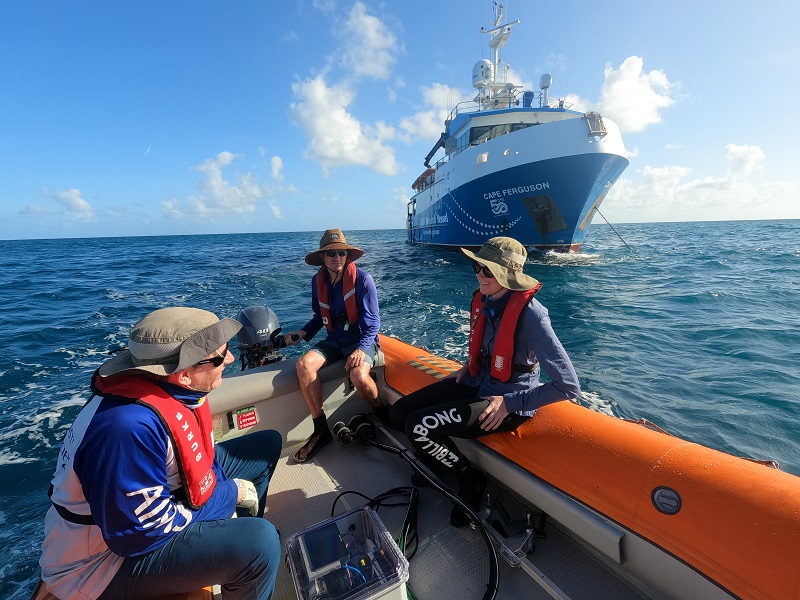When De’vereux Harvey was studying mechanical engineering seven years ago, she did not imagine it would lead to a job where she got to visit some of the most sought-after reef destinations in the world to design systems to support marine science.
Since joining the Australian Institute of Marine Science (AIMS) last year as a marine mechanical engineer 18 months ago, she has worked in the field at Davies Reef, 100km north-east of Townsville, and the Torres Strait.
This Thursday, on International Women in Engineering Day (23rd June), she will be working at Heron Island.
Dev is part of an AIMS team developing a suite of marine monitoring systems – ReefScan – that can undertake reef assessments and surveys, using state-of-the-art technology to manage data collection, analysis and reporting.
She is currently working on ReefScan Transom – a scientific camera and sensors mounted underneath a vessel to undertake surveys by harnessing artificial intelligence computing to collect data as the vessel travels over the area of interest.
The ReefScan system can be configured in different ways. Single or stereo pole cameras can be positioned at depth to collect imagery down to 10-12m while a boom configuration with multiple cameras is highly efficient for shallow reef surveys. Collected images can be geotagged into a single, large mosaic for use in GIS platforms, creating a powerful, high-resolution record of reef condition.
“I’m focused on the mechanical elements of ReefScan Transom, so developing and testing the camera housing, and the restraints and hardware that hold it to the boat,” she said.
“Designing anything for a marine environment is challenging enough just in terms of water ingress and corrosion. We’re also looking at fitting sensors and guards to minimise the risk of collision with underwater structures.
“In a tropical area heat becomes a huge problem, particularly when you have electronics that are stored inside fully contained housing. Overheating is a big issue to be addressed.
“The transom is boat-mounted so it needs to be very light – ideally one person can lift it – and easy to use. As we’re targeting some non-technical users, the system needs to be fully self-contained and easy to run.”

The AIMS team is working on its third prototype and expects to have it operational by the end of the year.
Dev said while she was a qualified scuba diving instructor, keen underwater photographer and had always had an interest in working in a marine environment, her path to AIMS was not a conventional one.
Graduating with first class honours in mechanical engineering and business management, she was one of about 10 females in a cohort of about 150 at Queensland University of Technology in 2015.
She undertook an internship with BMW in the UK for several months before joining a graduate program with the Department of Defence which took her around the country before she settled on a position in Melbourne working on a computing and communications system upgrade program for Army vehicles.
“Applying my engineering skills in a marine area was something that really attracted me to AIMS,” she said.
“In Queensland, mechanical engineers tend to be employed in industries such as the mining industry and infrastructure, so you don’t really think of marine research as a career option.
“But engineers are problem solvers and recently there has been a growing focus on the environment and renewable energies which will help attract women and young people to the field. “
Dev said she appreciated being part of a supportive team who have helped her on her steep learning curve at AIMS.
Her advice to women considering a career in engineering is to have confidence in yourself and go for it.
“In some industries it can be a ‘blokey’ sort of business and you need to back yourself and have the confidence to speak up and be heard,” she said.
Dev is also two years into part-time study at Swinburne University in pursuit of a PhD in ocean-based fluid mechanics.
For more about AIMS’ ReefScan Transom, click here.
Feature image by AIMS | Scott Bainbridge





